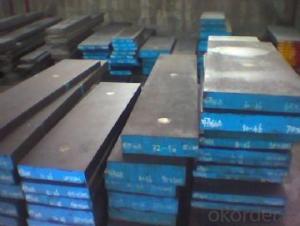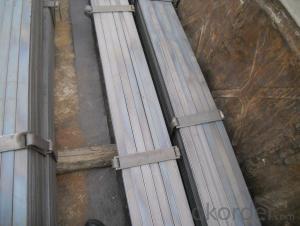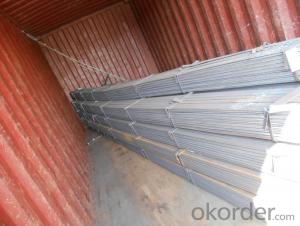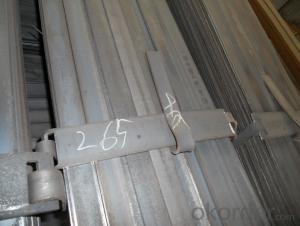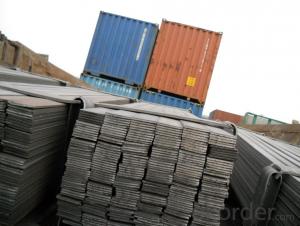Prime Hot rolled Spring Steel Bar/billet/products JIS standard/Europe standard/ ASTM standard
- Loading Port:
- Shanghai
- Payment Terms:
- TT OR LC
- Min Order Qty:
- 50 m.t.
- Supply Capability:
- 1200 m.t./month
OKorder Service Pledge
OKorder Financial Service
You Might Also Like
Specifications
Spring steel flat bar
Garde: 60Si2Mn, 60Si2MnA, 55CrMnA,50CrVA
Standard GB,JIS,ASTM,DIN,AISI,BS
LF & VD forge;ISO&TUV appr
Materials
Q195,Q215,Q235B,Q345B,
S235JR/S235/S355JR/S355
SS440/SM400A/SM400B
Product Category
Metallurgy,Mineral &Energy
Technique
HOT ROLLED
Packing
1.Big OD:in bulk
2.Small OD:packed by steel strips
3.woven cloth with 7 slats
4.according to the requirements of customers
Usage
Mechanical&manufacture,Steel strcuture,
Shipbuilding,Bridging,Automobile chassis
Main market
Middle East,Africa, Asia and some Uropean country and America ,
Australia
Country of origin
China
Productivity
15000 Metric Tons pet Month
Remark
Payment terms :T/T ,L/C
Terms of trade :FOB ,CFR,CIF ,DDP,EXW
Minimum order : 10 tons
Lead time :on or before 3-15 working days .
- Q:How does special steel meet the requirements of specific industries?
- Special steel meets the requirements of specific industries by offering superior mechanical properties, corrosion resistance, and heat resistance, which are essential for various applications. Its tailored composition and precise manufacturing processes ensure the steel can withstand extreme conditions, such as high temperatures, pressure, and harsh environments. Additionally, the versatility of special steel allows for customization to meet specific industry needs, resulting in enhanced performance, durability, and overall efficiency.
- Q:What are the different methods of surface pickling for special steel?
- Pickling special steel can be achieved through various methods. These methods comprise acid pickling, electrolytic pickling, mechanical pickling, and passivation. The most commonly employed method for pickling special steel is acid pickling. It entails immersing the steel in an acid solution, typically hydrochloric acid or sulfuric acid, to eliminate any surface impurities. By reacting with the steel's oxide layer, the acid dissolves it, leaving a pristine surface. Electrolytic pickling, on the other hand, involves passing an electric current through the steel submerged in an electrolyte solution. This creates a chemical reaction that removes surface impurities. Electrolytic pickling offers better control and enables a more consistent surface finish compared to acid pickling. Mechanical pickling utilizes abrasive materials like sandpaper or wire brushes to physically scrub the steel's surface and eliminate any scale or rust. It is often combined with acid or electrolytic pickling to achieve the desired surface finish. After pickling, special steel can undergo passivation to enhance its corrosion resistance. Passivation entails treating the steel with a chemical solution, typically nitric acid or citric acid, to form a protective oxide layer on the surface. This layer prevents further corrosion and enhances the steel's overall durability. It's worth mentioning that the specific method of surface pickling for special steel may vary depending on factors such as the type of steel, desired surface finish, and intended application. Therefore, it is essential to consult experts or adhere to the manufacturer's guidelines to ensure the appropriate pickling method is employed for special steel.
- Q:What are the different applications of high-speed special steel?
- High-speed special steel is a type of steel that is specifically designed to withstand high temperatures and maintain its hardness at high speeds. It has a wide range of applications across various industries due to its unique properties. Some of the different applications of high-speed special steel include: 1. Cutting Tools: High-speed special steel is widely used in the manufacturing of cutting tools such as drills, milling cutters, taps, and saw blades. Its excellent hardness, heat resistance, and wear resistance make it ideal for machining operations that involve high temperatures and high-speed cutting. 2. Aerospace Industry: The aerospace industry extensively utilizes high-speed special steel in the production of aircraft components. It is used for manufacturing turbine blades, engine parts, and other critical components that require high strength, high temperature resistance, and excellent fatigue resistance. 3. Automotive Industry: High-speed special steel finds its application in the automotive industry, particularly in the manufacturing of engine components, gears, and bearings. Its ability to withstand high temperatures, resist wear, and provide strength makes it suitable for various automotive applications. 4. Power Generation: High-speed special steel is used in power generation industries such as thermal power plants, nuclear power plants, and wind energy. It is used for manufacturing turbine blades, rotors, and other components that operate at high temperatures and high rotational speeds. 5. Tool and Die Making: High-speed special steel is widely used in tool and die making industries where precision and durability are crucial. It is used for producing molds, dies, punches, and other tooling components that require high strength, wear resistance, and toughness. 6. Medical Instruments: High-speed special steel is increasingly being used in the medical field for manufacturing surgical instruments, dental tools, and implants. Its corrosion resistance, high strength, and biocompatibility make it suitable for medical applications. 7. Industrial Machinery: High-speed special steel is used in various industrial machinery applications such as bearings, gears, shafts, and cutting tools. Its ability to withstand high temperatures, resist wear, and provide strength contributes to the efficiency and reliability of industrial equipment. In conclusion, high-speed special steel finds numerous applications across industries. Its unique properties such as high temperature resistance, hardness, wear resistance, and strength make it an essential material for cutting tools, aerospace components, automotive parts, power generation equipment, tool and die making, medical instruments, and industrial machinery.
- Q:What are the different heat-resistant grades of special steel?
- There are several heat-resistant grades of special steel, including stainless steels like 304H, 310H, and 347H, as well as nickel alloys like Inconel 600, Inconel 625, and Hastelloy C276. These grades are specifically designed to withstand high temperatures and maintain their strength and corrosion resistance even in extreme heat environments.
- Q:What are the properties of free-cutting steel?
- Free-cutting steel is a type of steel that is specifically designed to enhance machinability, making it easier to cut and shape with minimal effort. It possesses certain properties such as high sulfur content, which promotes the formation of manganese sulfide inclusions, improving chip formation during machining. It also typically contains elements like phosphorus, lead, or bismuth, which act as lubricants and reduce friction during cutting operations. Additionally, free-cutting steel has excellent surface finish, good dimensional accuracy, and high production efficiency, making it widely used in industries where machining speed and efficiency are crucial.
- Q:How does special steel enhance the durability of products?
- Special steel enhances the durability of products by providing exceptional strength, resistance to corrosion, and wear and tear. Its unique composition and manufacturing processes result in a material that can withstand high pressures, extreme temperatures, and harsh environments, prolonging the lifespan of various products and reducing the need for frequent repairs or replacements.
- Q:What are the applications of special steel in the oil and gas supply chain?
- Special steel has various applications in the oil and gas supply chain. It is commonly used in the construction of pipelines, offshore platforms, and drilling equipment due to its high strength, corrosion resistance, and ability to withstand extreme conditions. Special steel also finds its utility in the manufacturing of valves, fittings, and connectors, ensuring efficient and leak-free operations. Additionally, it is used in the production of storage tanks and vessels, providing reliability and safety in the containment of oil and gas. Overall, special steel plays a crucial role in enhancing the durability, performance, and safety of equipment and infrastructure within the oil and gas supply chain.
- Q:Can special steel be used in the renewable energy sector?
- Yes, special steel can be used in the renewable energy sector. Special steel, also known as alloy steel, offers enhanced properties such as high strength, durability, and corrosion resistance, making it suitable for various applications in renewable energy technologies. In wind energy, special steel is utilized for manufacturing wind turbine components. Wind turbine towers require strong and lightweight materials to withstand the dynamic loads and harsh environmental conditions. Special steel alloys, such as high-strength low-alloy (HSLA) steel, provide the necessary strength-to-weight ratio, ensuring the structural integrity of wind turbine towers. Solar energy systems also benefit from special steel. Concentrated solar power (CSP) plants utilize mirrors or lenses to focus sunlight, generating intense heat for electricity generation. Special steel alloys with high thermal conductivity and resistance to high temperatures are used in the construction of these components, ensuring efficient energy capture and durability. Moreover, special steel is employed in the manufacturing of hydroelectric power generation equipment. Turbine components, such as blades, shafts, and runners, require materials with high strength and resistance to erosion and cavitation. Special steel alloys, such as stainless steel and tool steel, possess these characteristics, ensuring the longevity and reliability of hydroelectric power systems. In summary, special steel finds numerous applications in the renewable energy sector. Its properties, including high strength, durability, and corrosion resistance, make it suitable for wind energy, solar energy, and hydroelectric power generation. By using special steel, the renewable energy sector can enhance the performance, efficiency, and lifespan of various renewable energy technologies.
- Q:What are the factors affecting the cost of special steel?
- The cost of special steel can be influenced by various factors. The price of raw materials is one of the primary factors. Special steel often requires specific alloys or additives, which can be expensive to obtain. Any fluctuations in the prices of these raw materials can directly affect the final product's cost. Another factor is the complexity of the manufacturing process. Advanced techniques and machinery are often used to produce special steel, and acquiring and maintaining them can be costly. The more intricate and specialized the manufacturing process, the higher the steel's cost. The demand and supply dynamics also play a role in determining the cost of special steel. If there is high demand but limited supply, the price is likely to go up. Conversely, if there is low demand and excessive supply, the price may decrease. Moreover, the level of customization required for the special steel can impact its cost. If a customer needs specific dimensions, tolerances, or surface finishes, additional processing steps may be necessary, leading to higher costs. Furthermore, transportation and logistics costs can affect the overall cost of special steel. If the steel needs to be transported over long distances or requires specialized handling, these additional expenses can accumulate. Lastly, market conditions and economic factors can influence the cost of special steel. Inflation, currency exchange rates, and overall economic stability can all have an impact on the pricing of special steel. In conclusion, the cost of special steel is determined by a combination of factors, including raw material costs, manufacturing complexity, demand and supply dynamics, customization requirements, transportation and logistics costs, and market conditions.
- Q:What are the specific requirements for special steel used in the chemical reactor industry?
- The specific requirements for special steel used in the chemical reactor industry can vary depending on the specific application and the type of chemicals being processed. However, there are some general requirements that are typically expected for this type of steel. Firstly, the steel used in chemical reactors must have excellent corrosion resistance. Chemical reactors often handle highly corrosive substances, such as acids, alkalis, and other reactive chemicals. Therefore, the steel must be resistant to the corrosive effects of these substances to ensure the integrity and durability of the reactor. Secondly, the steel should have high temperature resistance. Chemical reactions often require high temperatures to facilitate the desired chemical transformations. The steel used in these reactors must be able to withstand these elevated temperatures without losing its structural integrity or undergoing any significant deformation. Furthermore, the steel should have good mechanical properties, including high strength and toughness. The reactor may experience high pressure and mechanical stress during operation, so the steel must be able to withstand these conditions without failure. Additionally, the steel used in chemical reactors should have good weldability and formability. This allows for ease of fabrication and construction of the reactor, ensuring a reliable and efficient manufacturing process. Moreover, the steel should have low levels of impurities, such as sulfur and phosphorus. These impurities can adversely affect the performance of the steel in terms of corrosion resistance and mechanical properties. Therefore, the steel must meet strict quality standards to ensure it is suitable for use in the chemical reactor industry. In summary, the specific requirements for special steel used in the chemical reactor industry include excellent corrosion resistance, high temperature resistance, good mechanical properties, weldability, formability, and low levels of impurities. Meeting these requirements is crucial to ensure the safety, reliability, and efficiency of chemical reactors in various industrial processes.
1. Manufacturer Overview |
|
|---|---|
| Location | |
| Year Established | |
| Annual Output Value | |
| Main Markets | |
| Company Certifications | |
2. Manufacturer Certificates |
|
|---|---|
| a) Certification Name | |
| Range | |
| Reference | |
| Validity Period | |
3. Manufacturer Capability |
|
|---|---|
| a)Trade Capacity | |
| Nearest Port | |
| Export Percentage | |
| No.of Employees in Trade Department | |
| Language Spoken: | |
| b)Factory Information | |
| Factory Size: | |
| No. of Production Lines | |
| Contract Manufacturing | |
| Product Price Range | |
Send your message to us
Prime Hot rolled Spring Steel Bar/billet/products JIS standard/Europe standard/ ASTM standard
- Loading Port:
- Shanghai
- Payment Terms:
- TT OR LC
- Min Order Qty:
- 50 m.t.
- Supply Capability:
- 1200 m.t./month
OKorder Service Pledge
OKorder Financial Service
Similar products
New products
Hot products
Hot Searches
Related keywords
